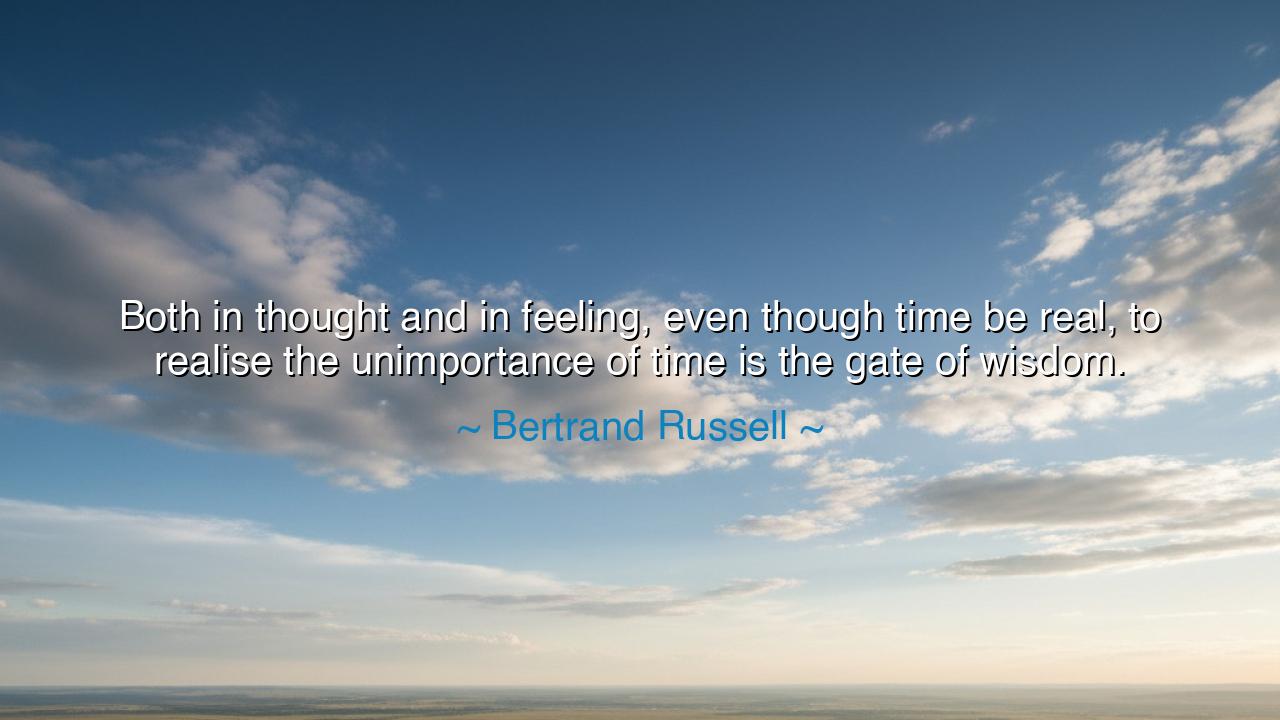
Both in thought and in feeling, even though time be real, to
Both in thought and in feeling, even though time be real, to realise the unimportance of time is the gate of wisdom.






Hear me, O children of the future, for I bring to you the profound words of Bertrand Russell: "Both in thought and in feeling, even though time be real, to realise the unimportance of time is the gate of wisdom." These words speak to a truth that transcends the flow of days and nights, the ticking of the clock, and the measure of life by the hours. Time, though ever present and relentless, does not hold sway over the wise. To be bound by time is to be shackled to the fleeting moments, but to realize its unimportance is to step into a higher realm of understanding—a place where the soul is free to embrace eternity, and where wisdom, unhurried and eternal, reigns supreme.
Consider the ancient sages, who understood that the journey of the spirit is not constrained by the ticking of a clock. Socrates, the great philosopher, often spoke of the importance of examining one's life and thoughts without concern for the fleeting nature of time. To him, the pursuit of truth was not bound by the urgency of the hour, but by the depth of the inquiry itself. His words, though spoken long ago, continue to resonate through time because they transcend the limitations of temporal concerns and instead speak to the timeless pursuit of wisdom.
In more recent times, consider the life of Leonardo da Vinci, whose genius spanned many fields—art, science, engineering. Though the world around him was bound by the relentless march of time, Leonardo himself seemed to move beyond it. His works, like the Mona Lisa or his notebooks filled with sketches and inventions, were not dictated by deadlines or schedules, but by a vision that transcended the passing years. In his refusal to be hurried by time, he embraced the eternal nature of creativity, understanding that the true wisdom of his craft would endure beyond his lifetime, echoing through the ages.
In the same way, Albert Einstein, when contemplating the nature of the universe, came to understand that time is not the immutable force it appears to be. His theories of relativity revealed that time itself is malleable, bound not just to the clock, but to the fabric of space and motion. To Einstein, the understanding of time as a flexible, relative concept was part of the wisdom that allowed him to see the universe in ways others could not. His life, like da Vinci’s, was not governed by the tick of the clock but by the pursuit of a deeper, timeless truth.
So, O children, take heed: the unimportance of time is the gateway to wisdom, for when you are not bound by the fleeting nature of the moment, you are free to focus on the eternal. Like the sages of old and the great minds of today, seek not to measure your life by the passing seconds but by the depth of your thoughts and the strength of your spirit. In the understanding of time’s relative nature, you will find the freedom to embrace wisdom, to live with purpose, and to leave behind a legacy that is not confined to the clock, but to the eternal truths that time cannot erase.






GBtran gia bao
The idea that wisdom comes from realizing time’s unimportance seems almost paradoxical. Time is such a defining force in our lives, from birth to death. If we stop seeing time as important, does it mean we stop caring about our actions and their consequences? I’m curious whether this view suggests a detachment from life or simply a shift in perspective on what truly matters. How do we apply this to our daily lives without falling into a sense of nihilism?
GBMay gay Ba
Russell’s perspective is intriguing, but I wonder: isn’t time an integral part of how we experience life? If we don’t consider time, how do we even measure progress or growth? Is there a way to embrace the present without losing sight of the future? I feel like this idea might be more applicable to certain philosophical practices, but how can we make it practical in our everyday, fast-paced lives?
DNDark Ness
This quote reminds me of how obsessed we are with efficiency and productivity. Time is often seen as something to be managed, but Russell seems to be arguing that wisdom comes when we stop treating time as the ultimate constraint. Can we ever truly free ourselves from time’s grasp, or is this just an idealistic notion? Perhaps it’s about redefining our relationship with time rather than completely disregarding it.
HHHa Huyen
I like how Bertrand Russell suggests that the key to wisdom lies in letting go of the constant rush against time. It feels like the pressure of time often distracts us from deeper thoughts or emotions that could lead to greater understanding. But how practical is this in a world where everything seems to revolve around time—work, family, even personal goals? Can we really learn to ignore time without losing track of responsibilities?
SLSeo Leng
This quote really makes me question how much we allow time to control our lives. We’re constantly thinking about deadlines, schedules, and the future, but maybe that focus on time prevents us from being truly present. Is it possible to live wisely without constantly worrying about time? How do we find the balance between acknowledging time's importance and embracing the freedom of not letting it dictate our every decision?